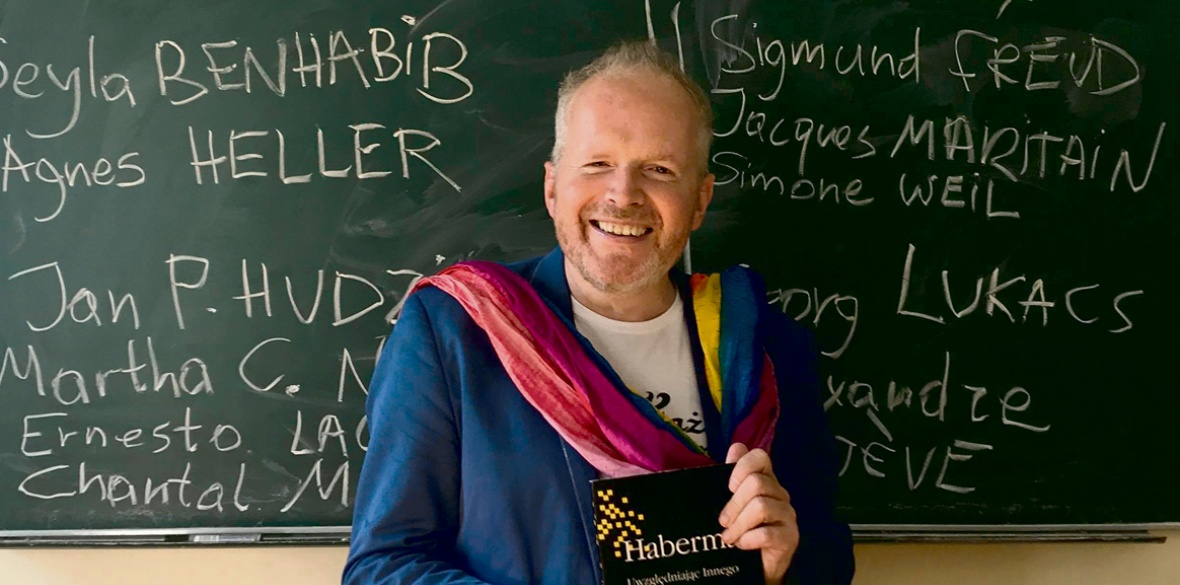This is the last article you can read this month
You can read more article this month
You can read more articles this month
Sorry your limit is up for this month
Reset on:
Please help support the Morning Star by subscribing here
TWO months ago the Star published a letter I wrote with the Polish academic Tomasz Kitlinski, to draw attention to the way a far-right agenda was penetrating Polish universities.
A prominent ruling Law and Justice (PiS) party politician, Przemyslaw Czarnek — well-known for his discriminatory views — had just been honoured with a medal Amicis Universitatis by Maria Curie-Sklodowska University in Lublin, where Kitlinski lectures.
Czarnek, the governor of Lublin province, has form when it comes to abusing minorities.
He uses his public position to slander the LGBT community as “degenerates,” encouraging street violence at pride marches.
He officially supports the declaration of “LGBT-free zones” in south-east Poland.
He has also formally accused Grzegorz Kuprianowicz, chairman of the Ukrainian Association in Lublin, of “insulting the Polish nation.”
And, as if to prove himself more Catholic than the Pope, he toes an ultra-conservative, anti-feminist line on women’s rights.
Kitlinski was appalled that such a man should be honoured by the university.
“It shocked my moral sense,” he wrote, adding: “I couldn’t remain indifferent” and so he protested online: “The governor of Lublin Region prides himself in offending Ukranians, Muslims, the LGBT community and women.”
Kitlinski himself is the very antithesis of Czarnek, a gay man and a prominent minorities’-rights and trade-union activist.
He studied in Lublin, Mainz, London, Paris and New York, but has always returned to Lublin to teach, to revive the city’s multiethnic past and to cultivate a cosmopolitan and tolerant culture.
By accusing me they intend to send a signal of intolerance to the population at large, and show that any criticism of their racist, homophobic and misogynist attitudes will be met with prosecution
His protest has, however, given Czarnek the opportunity to escalate the situation and hit back by ordering the state prosecutor to bring Kitlinski to court — just as he has done with Kuprianowicz, a case Czarnek lost.
As Kitlinski says: “By accusing me they intend to send a signal of intolerance to the population at large, and show that any criticism of their racist, homophobic and misogynist attitudes will be met with prosecution, case by case. This represents an attempt to close down free speech and open discourse on human rights in civil society.”
It is important to understand the legal mechanism Czarnek is using to prosecute Kitlinski.
He claims that it is not he that has been offended by Kitlinski’s protest, but “the constitutional organ of the state.”
In other words, to hold him accountable for his offensive views is to accuse the state directly.
That these are no rational grounds for prosecution doesn’t matter. This is doublethink, a coercive use of state power, specifically article 226 of the constitution, to ensure that Czarnek’s bigotry passes without question and that Kitlinski receives the maximum penalty which is a hefty fine and/or up to 12 months in prison, which in a case of “offending the state” can be doubled.
How is it possible for an elected official of the state to use the state to defend his bigotry? To understand this, one must recognise that in Poland the state has changed.
PiS has total control of the legislature, the executive and the judiciary. It is no longer a system of checks and balances to protect the rights of its citizens. It has become something else. An entity that demands submission — a “sacred” entity that takes offence and punishes its citizens.
This affair is more than gay-baiting and bruised egos. Kitlinski is in real danger from a toxic political environment. So, what can be done to defend him?
I began an online petition to spread the word. In Poland two grassroots movements, the Committee for the Defence of Democracy and the Citizens of the Republic of Poland, have voiced support for Kitlinski.
They accept that his protest against Czarnek had a sure foundation in fact and they defend his right to free speech under Article 54 of the Polish constitution.
But the real problem is that this case is not about free speech at all. Kitlinski is being used as a scapegoat in a bonfire of human rights created by a regime that is deliberately testing the extent to which it can get away with repressive politics in the teeth of EU norms.
However, in Robert Biedron, leader of the Spring Party (Wiosna), Poland has an openly gay MEP and the new united left candidate in the 2020 presidential elections, but Biedron’s election in May 2020 would be a miracle.
While MEPs like Biedron vote for sexual diversity in Europe, Kitlinski’s prosecution is a symbolic step in the suppression of minority rights at home.
For domestic politicians, Europe is a rainbow fig-leaf that it uses to conceal their own far-right agenda, to impose a national mono-culture that is homogeneous, hetero-normative and Catholic.
Their rhetoric covertly dehumanises the LGBT minority, while they claim to respect LGBT people but to oppose LGBT “ideology.”
Of course, they cannot say what LGBT “ideology” is, if not gay people themselves.
Their mouthpiece is the far-right media, such as the national station Radio Maryja (named after the Virgin Mary).
It repeated the accusation against Kitlinski of “defaming the state” every hour, every day, for a whole weekend, with the monotony of an Orwellian Hate Week.
Last November a special working group was set up in the Sejm (Polish parliament) to address issues of equality of the LGBT+ community. However, of the 24 members none is from PiS.
So, what is the political significance of this organised homophobia?
There is an important lesson from the past. In 1917 the Soviet Union removed the whole of the tsarist penal code, including the law that criminalised homosexuality and in 1922 the new Soviet criminal code removed all legal restrictions on sexual activity — a move that is the closest to total sexual liberation that socialism has come.
But in 1934 the Stalinist bureaucracy recriminalised it.
The homosexual minority found a voice in Harry Whyte, a communist of Scottish origin, who complained to Stalin in the rational terms of the earlier Soviet legislation.
Whyte pointed out that “it is inevitable that there will be a permanent minority of homosexuals in any society, be it capitalist or socialist. The masses are not intolerant towards this minority, and it represents no threat to the population.”
But as Whyte found out, a rational assessment counts for nothing when the state wants a scapegoat. In the Soviet Union of 1934 or Poland of 2020, homophobia is a key embodiment of repressive state power.
It is as useful as anti-semitism, Islamophobia or anti-feminism with the advantage that it has no ethnic bias. It can be applied equally to everyone.
Homophobia in contemporary Poland is symptomatic of a concerted attempt to control the way people think and feel.
It is part of the same politics that have made it illegal to mention Polish collaboration in the Holocaust.
Politics has risen to power by whispering what it takes to be the “secret desire of the masses” — to subordinate women, to persecute homosexuals, to expel foreigners and to establish “purity.”
The Law and Justice party aims to articulate, incite, and enact these desires. And the prosecution of Kitlinski is another attempt to demonstrate that these sinister and violent desires have become the law.








